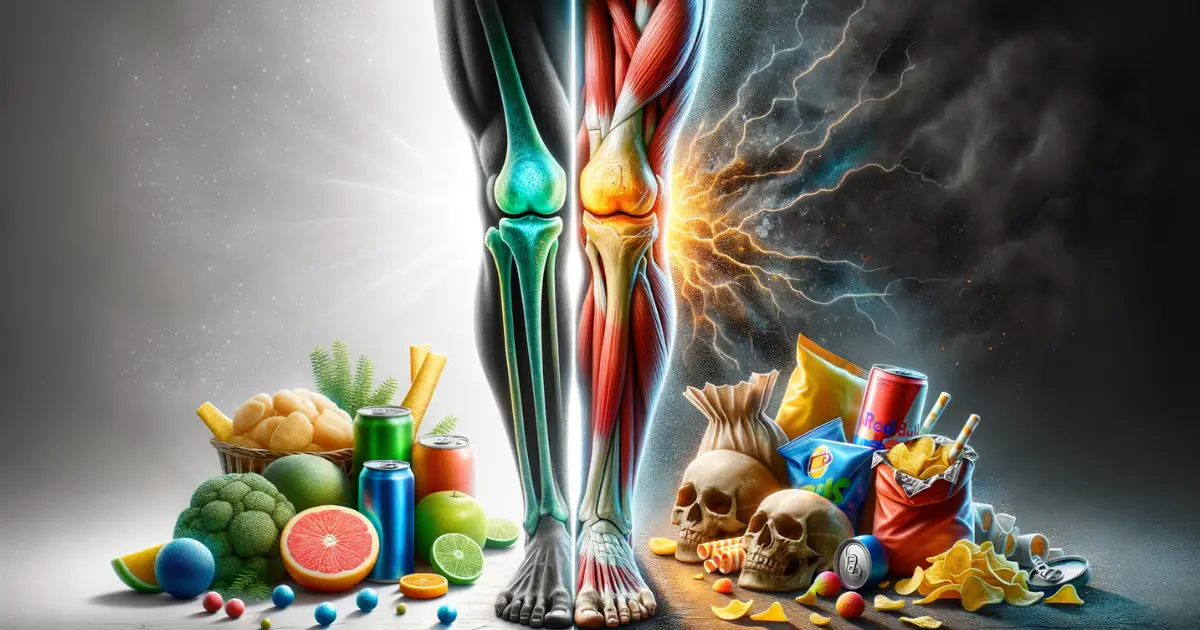December 10th, 2024
Staff Writer for Wake Up World
The modern diet, packed with ultra-processed foods, has far-reaching impacts on our health, and a new study sheds light on an alarming consequence: increased fat deposits within thigh muscles. This revelation adds a new dimension to our understanding of how diet quality affects musculoskeletal health, potentially paving the way for practical lifestyle changes.
The Hidden Dangers of Ultra-Processed Foods
Ultra-processed foods—those industrially manufactured with artificial flavors, colors, and chemically altered ingredients—dominate supermarket shelves. Think breakfast cereals, ready-to-eat meals, candies, frozen pizzas, and sugary drinks. These products are often designed to be convenient, long-lasting, and hyper-palatable, targeting the brain’s reward system to keep us coming back for more.
But this convenience comes at a price. A recent study presented at the annual meeting of the Radiological Society of North America (RSNA) reveals that diets high in ultra-processed foods are linked to increased fat stored inside thigh muscles, regardless of caloric intake or physical activity levels.
A Groundbreaking Study on Muscle Health
Researchers analyzed data from 666 participants in the Osteoarthritis Initiative, a long-term study aimed at understanding and preventing knee osteoarthritis. The participants, averaging 60 years of age, consumed diets where approximately 40% of their intake consisted of ultra-processed foods.
Using MRI imaging, researchers observed that higher consumption of these foods was associated with fatty degeneration in thigh muscles. Dr. Zehra Akkaya, a lead researcher and former Fulbright Scholar, explains:
The novelty of this study is that it investigates the impact of diet quality, specifically the role of ultra-processed foods in relation to intramuscular fat in the thigh muscles assessed by MRI.
The findings are significant, as intramuscular fat has been linked to reduced muscle function, greater frailty, and an increased risk of knee osteoarthritis. This condition already contributes heavily to global healthcare costs.
Why Muscle Fat Matters
Healthy muscles are not just for strength and mobility; they are vital for metabolic health and joint stability. When fat infiltrates muscles—a condition known as fatty degeneration—it replaces muscle fibers, compromising their function.
Dr. Akkaya notes:
Research from our group and others has previously shown that quantitative and functional decline in thigh muscles is potentially associated with the onset and progression of knee osteoarthritis.
Alarmingly, this decline occurs independently of weight, caloric intake, or physical activity. This means even individuals with otherwise healthy lifestyles may face hidden risks if their diets are heavily reliant on ultra-processed foods.
The Connection to Osteoarthritis
Osteoarthritis is a leading cause of disability worldwide, with knee osteoarthritis being particularly common. The study emphasizes the link between lifestyle factors, such as diet, and the risk of developing this condition. By reducing intramuscular fat through healthier eating, individuals may lower their risk of osteoarthritis progression.
Dr. Akkaya underscores the importance of these findings:
Understanding this relationship could have important clinical implications, as it offers a new perspective on how diet quality affects musculoskeletal health.
Shifting Towards a Healthier Diet
Reducing ultra-processed food consumption is no easy task, especially when these products are designed to be addictive. However, small, consistent changes can make a big difference. Prioritizing whole, minimally processed foods can help reduce intramuscular fat and improve overall health.
Here’s how to get started:
1. Opt for Whole Foods – Replace processed snacks and meals with whole, nutrient-dense options like fruits, vegetables, lean proteins, and whole grains.
2. Read Ingredient Labels – Avoid products with long ingredient lists filled with artificial additives, preservatives, and refined sugars.
3. Cook at Home – Preparing meals gives you control over ingredients and reduces reliance on packaged foods.
4. Prioritize Quality Over Quantity – Focus on the nutritional value of your meals rather than calorie counting.
5. Stay Active – While this study shows that physical activity alone can’t offset the effects of ultra-processed foods, regular exercise remains crucial for muscle and joint health.
A Path Forward
This research serves as a wake-up call to rethink our food choices. Ultra-processed foods may be convenient, but they are silently undermining our health. By shifting to a diet rich in whole, minimally processed foods, we can protect our muscles, reduce the risk of chronic conditions like osteoarthritis, and improve our overall well-being.
As Dr. Akkaya highlights:
Since this condition is highly linked to obesity and unhealthy lifestyle choices, there are potential avenues for lifestyle modification and disease management.
Taking proactive steps today can pave the way for a healthier tomorrow. Choose real, nourishing foods, and your body will thank you.
Take Action Today
- Plan your meals for the week using fresh, unprocessed ingredients.
- Swap one ultra-processed food for a whole-food alternative every day.
- Educate yourself and your family about the hidden risks of processed foods.
By making conscious choices, you can take control of your health and minimize the impact of ultra-processed foods on your body and mind.
Article Source
Eating High-Processed Foods Impacts Muscle Quality – press.rsna.org
About the author
John Patterson is an avid writer and researcher who delves into the latest scientific research. With an insatiable curiosity, he translates complex concepts into accessible narratives, allowing readers to embark on a journey of discovery. John bridges the gap between experts and the public through his work, igniting curiosity and inspiring meaningful conversations about scientific breakthroughs.
Most People Will Stay Stuck in 2025—Will You?
Most people will watch the world change and do nothing. But you? I bet you’re a bit like us—you see the writing on the wall. The system isn’t built for freedom, and waiting around for things to get better isn’t a strategy.
What do you know about building wealth outside the system?
If you’ve been looking for a way to break free from the grind and earn in a way that actually aligns with your values, you need to see this.
Inside this FREE masterclass, you’ll discover:
- A proven business model backed by a 50-year-old company
- A plug-and-play system—no chasing, cold messaging, or weird sales tactics
- A way to generate income while focusing on what actually matters
Most people will sit on this and do nothing. The good news? You don’t have to be most people.
Click here to watch now.
 If you’ve found value in our articles, we’d greatly appreciate your support by purchasing Mindful Meditation Techniques for Kids—A Practical Guide for Adults to Empower Kids with the Gift of Inner Peace and Resilience for Life.
If you’ve found value in our articles, we’d greatly appreciate your support by purchasing Mindful Meditation Techniques for Kids—A Practical Guide for Adults to Empower Kids with the Gift of Inner Peace and Resilience for Life.
In the spirit of mindfulness, we encourage you to choose the paperback version. Delve into its pages away from screen glare and notifications, allowing yourself to fully immerse in the transformative practices within. The physical book enriches the learning process and serves as a tangible commitment to mindfulness, easily shared among family and friends.
Over the past few years, Wake Up World has faced significant online censorship, impacting our financial ability to stay online. Instead of soliciting donations, we’re exploring win-win solutions with our readers to remain financially viable. Moving into book publishing, we hope to secure ongoing funds to continue our mission. With over 8,500 articles published in the past 13 years, we are committed to keeping our content free and accessible to everyone without resorting to a paywall.








